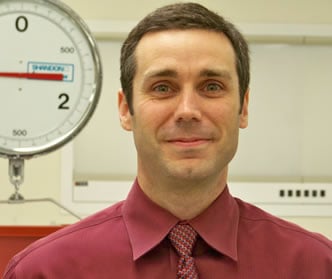
Dr. Owen Middleton is an assistant medical examiner for the Hennepin County Medical Examiner’s Office in Minneapolis, Minn. He earned a bachelor of science in biology from Vanderbilt University in Nashville, then went on to earn his MD with honors in research from the University of Arkansas College of Medicine.
He served a fellowship in forensic pathology at the University of Alabama at Birmingham, Department of Pathology, and a residency in anatomic and clinical pathology at University of Arkansas College of Medicine, Department of Pathology.
In addition to his work as an assistant medical examiner, Dr. Middleton is the ASCP CheckSample Section Co-Editor (Forensic Pathology), Minnesota Coroners’ and Medical Examiners’ Association president, and sits on the editorial board of the Journal of Forensic Sciences (appointed to term February 2010 – February 2015).
He has been published in the Journal of Forensic Sciences, Journal of Toxicology, and Parasitology Research. Dr, Middleton’s professional memberships include the American Academy of Forensic Sciences, American Society for Clinical Pathology, College of American Pathologists, Minnesota Coroners’ and Medical Examiners’ Association, and National Association of Medical Examiners.
When did you first decide to become a doctor? Why?
I first considered entering the medical profession when I was in middle school. Science was always the area of study that most interested me, and the idea of combining that interest with helping others seemed a perfect combination for a rewarding career.
How/why did you choose the medical school you went to?
The medical school I attended was near the area where I was raised, so familiarity with the school and having family nearby for support were big factors.
What surprised you the most about your medical school studies?
Going into medical school I was positive I was headed for a career in a certain field of medicine. As I rotated through the various clerkships, I realized that I really enjoyed aspects of almost every branch of medicine, making my final career determination much more difficult than I had anticipated.
What led you to becoming a medical examiner/why did you decide to focus on becoming a medical examiner?
My interest in becoming a medical examiner initially developed when skimming through criminal justice course textbooks of college acquaintances. I found the topic fascinating at that time but developed a greater interest during basic pathology lectures in medical school. The decision to truly pursue a career as a medical examiner was solidified when I did an elective rotation as a medical student with the local medical examiner’s office. Observing firsthand the application of medical knowledge to criminal investigations sealed my desire to enter the field.
Has being a medical examiner met your expectations? Why?
Being a medical examiner has met my expectations. I wanted to work in a medical field that challenged me and allowed me to frequently interact with others who work both in medicine and in fields outside of medicine. Forensics has provided that combination.
What do you like most about being a medical examiner?
It’s hard to narrow this answer down to any one aspect of the job. Every day seems to offer something different, which keeps the job interesting. For instance, I may wake up in the morning thinking I will be spending the day doing paperwork, only to discover I have to attend a homicide death scene or get a last-minute subpoena to testify in a trial (thankfully there is usually ample warning for that). Finding the answer as to why someone has died from a sudden unexpected death is rewarding from a knowledge standpoint, but the true reward comes from being able to explain to a decedent’s family why that individual died, and in some cases stress the importance of how a diagnosis might affect their own personal health.
What do you like least about being a medical examiner?
Because most medical examiner careers serve one way or another within a government system, whether at a county or state level, the position can be somewhat tethered to the changing elected officials. Although medical examiner offices are supposed to function independently from other agencies, such as law enforcement or county attorney offices, a family that disagrees with a death certification or an unpopular certification that garners media attention can quickly bring unwanted attention to the political officials in charge of the jurisdiction. Without good governmental relations, this can have repercussions for the medical examiner. However, offices with a good working relationship with their overseeing governmental authority will interact with elected officials who understand that independent investigation is key to accurate and honest death certification, and therefore will support the medical examiner who is conducting objective investigations despite possible political consequences.
What was it like finding a medical examiner job–what were your options and why did you decide what you did?
Medical examiner jobs are frequently available around the country, but not necessarily readily available within a given geographic area. It all depends on the location, population, the particular death investigation system in place, and funding support offered by a given state or county. All offices will have pros and cons, but the medical examiner community around the country is small enough that finding out which offices are poorly managed or do not have the support of the government for which they work is not difficult. I managed to find a position in an office as I was finishing my training that fit the ideal of what I thought a career in this field should embody.
Describe a typical day at work as a medical examiner.
As indicated in the answer to question 6, the lack of a “typical” day is one of the things I like about this job. However, most of the days will likely involve a combination of reviewing information gathered by medico-legal death investigators for deaths reported to the office, reviewing supplemental information for continuing cases, performing autopsies, completing microscopic examinations, editing autopsy reports, communicating with the decedent’s family, and certifying death certificates. The amount of interaction with law enforcement will clearly vary depending on the crime rate within a given jurisdiction.
How does working with law enforcement play into your job?
Law enforcement agencies are frequently the first involved with deaths that occur outside of a hospital. Therefore they frequently make the phone call to alert a medical examiner’s office that a death has occurred. If the death has occurred under suspicious circumstances according to their initial assessment of the death scene, they may request that a medical examiner actually attend the scene. Some medical examiner’s offices have policies that a physician should be in attendance at every suspected homicide scene unless the death actually happens in a hospital subsequent to the initiating event. Occasionally, suspicious evidence might be found during the autopsy examination. Then the medical examiner has the obligation to alert law enforcement of the findings so they can initiate an investigation. Detectives will frequently attend autopsies so they can observe firsthand the injuries that a victim has incurred and supplement their investigation with the information they acquire.
What is the biggest misconception about being a medical examiner? Why do you think that is?
The biggest misconceptions about the profession now come from how medical examiners and forensic science, in general, are portrayed in the media. Television shows indicate that highly sophisticated, expensive testing modalities are used to solve every case. In reality, it is an interpretation of the history, autopsy, and toxicology findings that provides an answer in the vast majority of cases, just like a clinician depends upon the history, physical examination, and selected ancillary tests to formulate a diagnosis for the living. It frequently jokes that forensic pathologists are not “real doctors” because we do not apply our knowledge to the living, but core medical knowledge and diagnostic skill remain the foundation for the profession.
On average: How many hours a week do you work? How many hours do you sleep per night? How many weeks of vacation do you take?
I probably average 50 to 60 hours of work per week and get plenty of sleep, usually seven hours a night. I tend to take fewer vacations than I could, simply as a personal choice, but I probably average taking two or three weeks of vacation per year.
Are you satisfied with your income?
Having been raised in a typical middle income family, I cannot complain at all about my income. There are physicians in other fields of medicine who make substantially more and substantially less than I. The key is to find a job that you really enjoy doing every day. That is from where the true satisfaction will come.
If you took out educational loans, is/was paying them back a financial strain?
I probably could have paid back more of my educational loans by now if I chose to, but the interest is so low on these types of loans that I have opted to devote more of my income to paying ahead on other items such as my home mortgage. The loans are not a financial strain.
In your position now, knowing what you do – what would you say to yourself 10 years ago?
Enjoy every step of the journey.
What information/advice do you wish you had known when you were beginning medical school?
Looking back, I wish that I had placed more emphasis on enjoying the pursuit of knowledge. Learning all of that medical information was work at the time. It is now pleasurable to apply that knowledge to a given scenario and learn the latest updates for medical conditions.
What types of outreach/volunteer work do you do, if any?
Most of my volunteer activities involve working with national pathology and forensics organizations and teaching about forensic pathology to high school students. Otherwise, at this point in my life, I try to spend as much time as I can with my family outside of work, although I do try to donate platelets when I have the opportunity.
Do you have a family? If so, do you have enough time to spend with them?
I am married with one elementary school-age child. I do not feel that I can ever spend enough time with my family, but realistically I am luckier than a lot of people in that regard, whether in the medical profession or not.
How do you keep your work separate from your personal life?
It can be difficult to keep thoughts from the work day out of one’s head after leaving the office. Like anything though, you set your priorities and attend to that which is of most importance at the time. Although I have certainly had some late nights catching up on work, most of the time it is not an issue and I get to enjoy my time away from work.
Do you have any final piece of advice for students interested in pursuing a medical examination as a career?
Unfortunately, exposure to forensic pathology is usually quite ancillary to most medical school studies, sometimes not even in a nearby county. Most individuals who develop an interest have had some exposure to the field outside of medical school, although television shows have brought the career a little more to the forefront. If a student has an interest, no matter how small, he or she should contact their closest medical examiner office and see if they can arrange a day to see how death investigations are handled for the area. Most offices would be thrilled at the chance to potentially recruit somebody into the field, as only about 40 people complete forensic pathology fellowships across the country in a given year. Elective student rotations are the best chance of spending an extended period of time with an office, but these rotations are usually quite popular with students. In the end, the field is not for everyone. You deal with decomposing bodies and see humanity at its worst. But if you can tolerate such aspects, the field is immensely rewarding.
